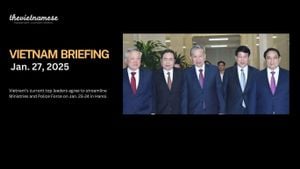The German Free Democratic Party (FDP) stands on the brink of electoral turmoil as preliminary outcomes from the recent election reveal significant underperformance, raising concerns about its future viability within the Bundestag. The evening after the polls closed was marked by anxiety and uncertainty, with party leaders admitting shortcomings and grappling with the possibility of failing to surpass the five percent threshold for parliamentary representation.
Party Vice President Wolfgang Kubicki was the first to address the gathering of FDP supporters, tempering their initial jubilation as he acknowledged the stark reality facing the party. "The majority of our voters have grown estranged from the traffic light coalition and the role of the FDP within it, and we have not succeeded in sufficiently regaining their trust after the collapse of the coalition on November 6," he confessed, setting the tone for what he foresees as "a long night" for the party. Kubicki candidly assessed the situation, noting, "we have fallen short of expectations, as have almost all others."
Fresh from their January congress full of optimism, many party members entered the election confident of recapturing the public’s support. Their leader, Christian Lindner, had earlier declared his disappointment over the conclusion of the coalition, but he also demonstrated eagerness to pivot toward new beginnings. Once the finance minister, Lindner had positioned himself as pivotal following the traffic light coalition with the Social Democrats (SPD) and Greens, which had left many within the party feeling disillusioned and currently tarnished. Lindner's self-assured demeanor had not faltered leading up to this election, as he spoke visibly determined to see the party reestablish itself within Germany's political framework.
Compounding the FDP's challenges, poll performances indicated the party was struggling to reach even the four percent approval mark among voters. Lindner, displaying both resolve and determination, likened his focus to driving—a metaphor encapsulating his perception of the need to avoid veering off course. “I look where I want to go, just like driving; if you want to stay on track, you need to keep your eyes on where you’re heading,” he remarked.
Despite the uncertainty surrounding their electoral standing, the FDP crafted what they termed a 100-day plan one week prior to the election, taking cues from the urgent need to present concrete strategies should they partake in any future government assembly. The ambitious plan proposed substantial financial relief for citizens and businesses, highlighting proposals to raise the basic tax allowance by 500 euros monthly and to establish tax-free overtime pay for full-time workers. The agenda included eliminating bureaucratic hurdles within federal law and emphasized making energy more affordable through drastic reductions to electricity taxes.
Yet, even with all these reforms outlined, the skepticism surrounding FDP's positioning within any coalition remained palpable. Lindner's proposed timeline for Germany's climate neutrality was extended from 2045 to 2050, aligning more closely with broader EU commitments, but critics questioned the viability of any coalition formed with the FDP as the smallest political player on the national stage.
Following the lukewarm reception from voters and party factions, the backdrop leading to the elections had been infused with hope; yet, as election night unfolded, it became evident this hope may not translate to votes. Kubicki’s earlier remarks hinted at deep introspection within the party's ranks, with diverse support taking longer to materialize than anticipated. While the FDP had initially believed they could capitalize on the support of undecided voters, the results indicated otherwise, shattering expectations.
With grim reflections on the night encapsulating both the sentiments of party leaders and the electorate, the impending uncertainty surrounding the FDP could usher unforeseen political ramifications. Left to confront the question of trust and credibility, the party's leadership will need to reflect on their strategies moving forward. Will this be the moment the FDP re-evaluates its commitments, or will they persist with ambitions rooted steeply within the tumultuous ground of present-day German politics?



